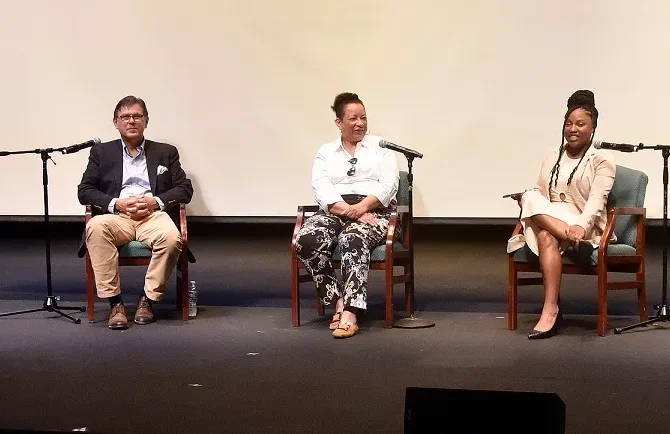MARYLAND MATTERS: The Prince George’s County Council will hold a virtual listening session Tuesday for candidates willing to serve on the jurisdiction’s new police accountability board.
The 11-member body is mandated through legislation state lawmakers approved last year.
The council plans to approve five members to the board and County Executive Angela Alsobrooks (D) will name the other five, along with the board chair.
The 19 people who applied for the council-appointed positions include community leaders, activists, a paralegal, former state delegate Carlo Sanchez (D), and a criminal justice college professor.
One of the candidates, Peter Miller, is a former police officer on a “do not call list.” The list represents officers whose past conduct makes them unreliable as witnesses in court proceedings.
The county lists several provisions that exclude a person from serving on the police board such as being a current state, county, or municipal employee or a former or active police officer on a do not call list.
Legislation the council approved this summer allows councilmembers to select five members to the police accountability board and the county executive to nominate another five and the board chair.
The council must ultimately approve all 11 members but those votes are scheduled for different dates. While the council could approve its appointees by Oct. 4, the county executive appointees are scheduled to appear before a council committee Oct. 11 and then confirmed during a public hearing by Oct. 25.
Five of those individuals who applied through the county executive’s office are Sheila F. Bryant, Kelvin Davall, Lafayette Melton, Marsha Ridley and Daniel Vergamini.
They participated in a virtual listening session Thursday:
- Bryant is a Marine Corps veteran and an attorney who ran an unsuccessful campaign for the Democratic nomination in 2020 to represent the 4th congressional district.
- Davall is a computer engineer appointed to serve as the police accountability board chair. He also chaired the county’s Citizen Complaint Oversight Panel that the council voted in July to abolish because of the formation of the police board.
- Melton is a county native who works as a human resource professional with experience in diversity, inclusion and workforce planning.
- Ridley is a Washington, D.C., native hired as one the city government’s first engineers whose portfolio included work in property management. She has also been a member of member of a local community association in the county for more than 20 years.
- Vergamini works as a federal government employee on audits and global development programs in the Office of Inspector General. Similar to Davall, he served three years on the county’s old police oversight panel.
John Erzen, deputy chief of staff in the county executive’s office, said Monday the sixth person nominated will be from the Latino community.
“It’s important to us to have diversity on the board,” he said Monday.
The police accountability board will hold quarterly meetings, review complaints filed by residents and officers from the county or a municipal police department and submit an annual report to the county executive and council.
The board will also appoint residents to serve on an administrative charging committee and a trial board. The committee would review allegations made against a police officer and recommend possible disciplinary action. An officer can appeal a decision before a local trial board.
Although most jurisdictions have already formed their local police accountability boards, a few still continue the process of appointing members.
The Baltimore County Council last week confirmed eight of the nine members of its first-ever board. The ninth person nominated by County Executive John A. Olszewski Jr. (D), Francis Ward, who works as a district court constable, will be reviewed by the council during a work session Tuesday, with a final vote scheduled for Oct. 3.
The other members include a nurse, an attorney, a former police officer and community leaders.
“A strong relationship between law enforcement and the communities they serve is vital, and accountability is fundamental in building trust,” Olszewski said in a statement. “I’m confident that these nominees will use their varied personal experiences and unique perspective to help shape a set of recommendations that will improve law enforcement and public safety countywide.”
This article was written by Maryland Matters, read more stories like this here.











